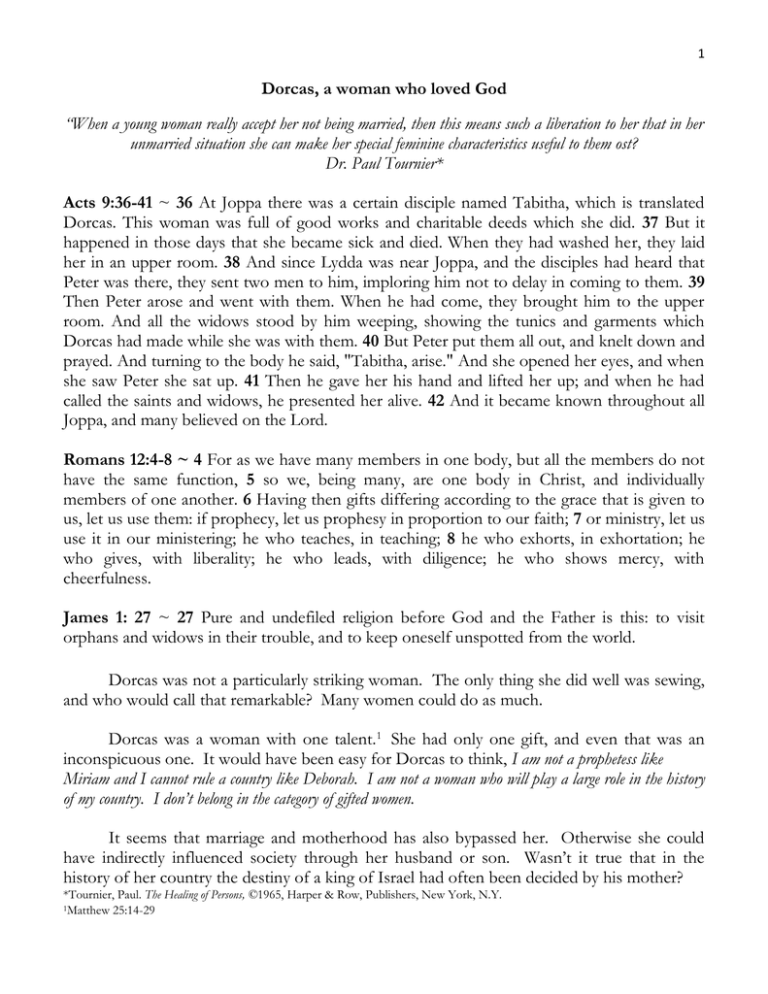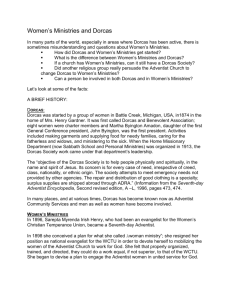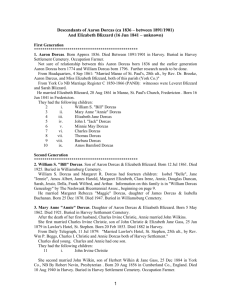Dorcas
advertisement

1 Dorcas, a woman who loved God “When a young woman really accept her not being married, then this means such a liberation to her that in her unmarried situation she can make her special feminine characteristics useful to them ost? Dr. Paul Tournier* Acts 9:36-41 ~ 36 At Joppa there was a certain disciple named Tabitha, which is translated Dorcas. This woman was full of good works and charitable deeds which she did. 37 But it happened in those days that she became sick and died. When they had washed her, they laid her in an upper room. 38 And since Lydda was near Joppa, and the disciples had heard that Peter was there, they sent two men to him, imploring him not to delay in coming to them. 39 Then Peter arose and went with them. When he had come, they brought him to the upper room. And all the widows stood by him weeping, showing the tunics and garments which Dorcas had made while she was with them. 40 But Peter put them all out, and knelt down and prayed. And turning to the body he said, "Tabitha, arise." And she opened her eyes, and when she saw Peter she sat up. 41 Then he gave her his hand and lifted her up; and when he had called the saints and widows, he presented her alive. 42 And it became known throughout all Joppa, and many believed on the Lord. Romans 12:4-8 ~ 4 For as we have many members in one body, but all the members do not have the same function, 5 so we, being many, are one body in Christ, and individually members of one another. 6 Having then gifts differing according to the grace that is given to us, let us use them: if prophecy, let us prophesy in proportion to our faith; 7 or ministry, let us use it in our ministering; he who teaches, in teaching; 8 he who exhorts, in exhortation; he who gives, with liberality; he who leads, with diligence; he who shows mercy, with cheerfulness. James 1: 27 ~ 27 Pure and undefiled religion before God and the Father is this: to visit orphans and widows in their trouble, and to keep oneself unspotted from the world. Dorcas was not a particularly striking woman. The only thing she did well was sewing, and who would call that remarkable? Many women could do as much. Dorcas was a woman with one talent.1 She had only one gift, and even that was an inconspicuous one. It would have been easy for Dorcas to think, I am not a prophetess like Miriam and I cannot rule a country like Deborah. I am not a woman who will play a large role in the history of my country. I don’t belong in the category of gifted women. It seems that marriage and motherhood has also bypassed her. Otherwise she could have indirectly influenced society through her husband or son. Wasn’t it true that in the history of her country the destiny of a king of Israel had often been decided by his mother? *Tournier, Paul. The Healing of Persons, ©1965, Harper & Row, Publishers, New York, N.Y. 1Matthew 25:14-29 2 Yet there is one thing in which Dorcas surpassed every other woman in the Bible. She is the only one who was called a disciple! Dorcas was a disciple, a follower of Jesus, and that changed everything. She opened her heart to Him before she followed Him. He became her Saviour before He became her Lord. And although she had received Him as her Redeemer she didn’t stop there. Faith is more than just fellowship with God. One uses it to serve others – true faith expresses itself in deeds. A person who follows Christ is moved toward people as He was. He becomes creative and wants to do all he can to give his life maximum purpose. Therefore, the disciple Dorcas did what came naturally to her. She sewed, especially for the poor widows. She sewed to the best of her ability. Joppa (now Jaffa), a port along the Mediterranean Sea, must have had a large population of widows. During the season of bad weather, many of its fishermen were shipwrecked and drowned. These women had lost not only their husband but their incomes. There was no Social Security in those days, but that really wasn’t necessary, for, again and again, God had told His people to take good care of the widows and orphans.2 If the people obeyed God’s orders, then the widows had no needs and the people enjoyed abundant blessings, as the reward which God had promised them.3 God had promised that He would be their husband.4 They enjoyed His special protection and care. Being a disciple, Dorcas knew what made her Lord happy, and that was to take care of this group of people in whom He was interested in a special way. Therefore, she didn’t do her work halfheartedly. It wasn’t just a pastime to her. She did it with a definite goal in mind. She did it with all her heart because she loved God. When Jesus had entered her heart, Dorcas had become a free woman. He had called Himself the Truth. 5 He stated further that those who were freed by Him are truly free.6 Dorcas operated from the base of freedom. The Bible leaves room for the thought that Dorcas was an unmarried woman, but this does not seem to have caused her to be frustrated by feelings of inferiority. She had no desire to compete in importance with the married women around her. She was not jealous of mothers with children. A woman who is truly free is free to be Dorcas became a woman who was far ahead of her time. She experienced a fulfillment in life while working on her own, which was unique for the time in which she lived. Many women 2Exodus 22:22-24; Deuteronomy 10: 17, 18 14:29; 24:19 4Isaiah 54:4, 5 5 John 14:6 6 John 8:32, 36 3 Deuteronomy herself and can develop her character in the way God uniquely created her. Someone who is free inside is a happy person who distributes happiness. Society cannot do without these people. Such a woman doesn’t feel she has to fight for her rights. She doesn’t have to work hard to become somebody – she already is somebody. 3 living in Jaffa today would certainly be glad to exchange places with her. Dorcas met a real need by sewing. She required little for herself. She lived for others. That was the reason for her own happiness. “He who wants to win happiness has to share it. Happiness was born as twins,” Lord Byron, the English poet later said. Many of the widows in Joppa were walking around in clothing sewn by Dorcas. There was a growing gratitude toward her. Dorcas, who probably stood alone in life, was most likely able to give moral and spiritual support to the widows. She understood lonely women and could talk with them. Consequently, she utilized her potential. In so doing, she became a person of importance in the church. Then came a sudden blow. Dorcas became ill and died. Someone remembered that Peter was working in Lydda, only ten miles away and hastily sent two men to fetch him. They knew that he possessed supernatural power. Hadn’t they heard that sick people were restored when Peter’s shadow fell on them?7 Hadn’t he and John healed a lame man?8 All their hopes were centered on him. Peter came right away. In the upper room where the dead body lay, Peter was encircled by weeping women. They told him how terribly the missed Dorcas, how bereft they were without her. They showed him the clothes she had made for them. Often only good things are said of the dead. In this case, however, it was very obvious how those who stayed behind were suffering from the loss of the life which had been taken. Dorcas’ love for them had given them a great love for her. What else could be expected? Peter did what he say the Lord do in a similar situation.9 He asked everyone to leave the room, then he prayed and restored Dorcas to life through the power of God. The Bible records accounts of seven people who were raised from the dead. Dorcas was the only adult woman among them. The news of her resurrection became the talk of the day in Joppa. “Did you hear?” the people exclaimed to one another. “Dorcas is alive again! Peter has raised her from the dead.” Then something else remarkable occurred. The people realized that God has wrought a miracle, so they honored God Himself rather than Dorcas or Peter. Through these happenings people realized the emptiness of their own lives. They also desired to believe in the Lord Jesus. They began to understand some of the real values in life. They wanted to belong to Him as Dorcas did. They desired to become Christians, new people with a new perspective in life. “What is that in your hand?” the Lord had asked Moses long ago. 10 He answered, “A rod.” “Go and work with that rod,” God said, “And you will be My servant.” 7Acts 5:14 3:1-10 9Mark 5:40-42 10Exodus 4:2-5 8 Acts 4 If God had asked Dorcas the same questions she would have answered, “A needle and thread, Lord.” Then He would have shown her that these were precisely the instruments with which she could serve Him. The life, death and resurrection of Dorcas helped spread the Gospel. Peter could not leave Joppa for a while because he was needed by the people who were inquiring about God. Dorcas started a movement that spread beyond the borders of her city and country. Indirectly she became a great evangelist. Today there are Dorcas Groups all over the world. Millions of needy people are fed and clothed by this society. Who can number the countless women who were influenced by the life of this woman, Dorcas? Her bright example will never be extinguished. That is the most any disciple can desire. Dorcas, a woman who loved God (Acts 9:36-42; Romans 12:4-8; James 1:27) Questions: 1. What was typical of Dorcas’ life according to Acts 9:36? 2. Study her dedication in light of Matthew 25:14-29 and Romans 12:4-8 and list your findings. 3. What might have been the background of Dorcas’ dedication toward the widows (Deuteronomy 10:17, 18; 14:29) 4. Tell briefly what happened to Dorcas. 5. What do you consider to be the most important result of her resurrection? 6. Which facts in this story appeal to you the most? How will they change your life? All material was taken from Her Name is Woman – Book One by Gien Karssen, NAVPRESS, Colorado Springs, CO






